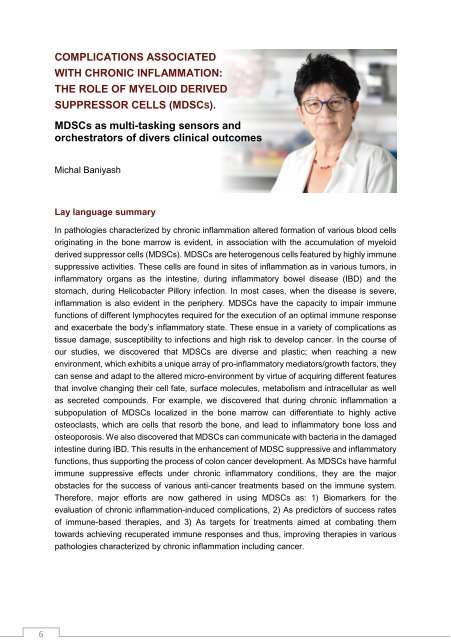You also want an ePaper? Increase the reach of your titles
YUMPU automatically turns print PDFs into web optimized ePapers that Google loves.
COMPLICATIONS ASSOCIATED<br />
WITH CHRONIC INFLAMMATION:<br />
THE ROLE OF MYELOID DERIVED<br />
SUPPRESSOR CELLS (MDSCS).<br />
MDSCs as multi-tasking sensors and<br />
orchestrators of divers clinical outcomes<br />
Michal Baniyash<br />
Lay language summary<br />
In pathologies characterized by chronic inflammation altered formation of various blood cells<br />
originating in the bone marrow is evident, in association with the accumulation of myeloid<br />
derived suppressor cells (MDSCs). MDSCs are heterogenous cells featured by highly immune<br />
suppressive activities. These cells are found in sites of inflammation as in various tumors, in<br />
inflammatory organs as the intestine, during inflammatory bowel disease (IBD) and the<br />
stomach, during Helicobacter Pillory infection. In most cases, when the disease is severe,<br />
inflammation is also evident in the periphery. MDSCs have the capacity to impair immune<br />
functions of different lymphocytes required for the execution of an optimal immune response<br />
and exacerbate the body’s inflammatory state. These ensue in a variety of complications as<br />
tissue damage, susceptibility to infections and high risk to develop cancer. In the course of<br />
our studies, we discovered that MDSCs are diverse and plastic; when reaching a new<br />
environment, which exhibits a unique array of pro-inflammatory mediators/growth factors, they<br />
can sense and adapt to the altered micro-environment by virtue of acquiring different features<br />
that involve changing their cell fate, surface molecules, metabolism and intracellular as well<br />
as secreted compounds. For example, we discovered that during chronic inflammation a<br />
subpopulation of MDSCs localized in the bone marrow can differentiate to highly active<br />
osteoclasts, which are cells that resorb the bone, and lead to inflammatory bone loss and<br />
osteoporosis. We also discovered that MDSCs can communicate with bacteria in the damaged<br />
intestine during IBD. This results in the enhancement of MDSC suppressive and inflammatory<br />
functions, thus supporting the process of colon cancer development. As MDSCs have harmful<br />
immune suppressive effects under chronic inflammatory conditions, they are the major<br />
obstacles for the success of various anti-cancer treatments based on the immune system.<br />
Therefore, major efforts are now gathered in using MDSCs as: 1) Biomarkers for the<br />
evaluation of chronic inflammation-induced complications, 2) As predictors of success rates<br />
of immune-based therapies, and 3) As targets for treatments aimed at combating them<br />
towards achieving recuperated immune responses and thus, improving therapies in various<br />
pathologies characterized by chronic inflammation including cancer.<br />
6

















